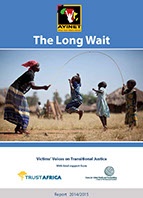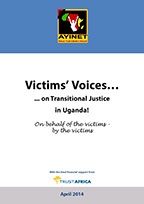For the first time in history, we study war in order to learn how to prevent it
29th May 2014, Kampala
The second day of the National War Victims’ Conference kicked off with a speech by His Grace Archbishop Desmond Tutu who argued for the benefits of Transitional Justice.
“Transitional justice promises a better future,” he said. “But In order to create a better future, we must understand our past.”
He argued that it was far easier to blame others for our failings and that “conflict begins in the mind of people.” “Conflict is much bigger than gun fire and bombs.”
He explained how Transitional Justice, in particular truth telling, has contributed to the peaceful transition of South Africa and how “victims and perpetrators told their stories on public platforms.” “It was a gruelling process, but one that both victims and perpetrators experiences as liberating.”
Building on the Conference’s first day, the moderator handed over the floor to speakers discussing various issues of criminal justice and amnesties.
Amnesties – the right way forward for victims?
Justice Peter Onega, the Chairman of the Amnesty Commission, outlined the history of amnesties in Uganda and argued that their introduction in 2000 was part of the Government effort to end the conflict between the Lord’s Resistance Armey and the Government.
He explained how amnesties allowed tens of thousands of rebels to return home and stop fighting as well as acting as a bridge between the LRA and the Government to help broker a peace deal.
However, Justice Onega also focussed on what amendments have been made to the Amnesty Act 2000 – in particular, removing blanket amnesties.
The Chairman then said he deeply regretted that the Act had not focussed on victims. “You cannot talk about reconciliation if you do not take into account the needs of victims,” he said.
Onega said he wanted to see an “independent and well-funded body” to look at writing a new legislative bill which would include conditions for amnesties – like truth telling, provide accountability and protect the rights of victims.
War victims’ response
Amnesties proved to be a controversial topic with the majority of victims who spoke opposing them.
One victim said in his home in West Nile, “amnesty brought disunity.” “When amnesties were given to the traitors they were rewarded with money,” he said. “When the victims, who the perpetrators had caused harm, saw what was happening, they said it was better to go into the bush and come back for money.”
Another man said people with no money needed legal support to help them with land disputes. A woman said amnesties were limited – “if your child has been abducted, or raped, of killed, how do you think an amnesty feels?” she asked.
One woman told how she has been abducted with her two children and forced to move with the LRA. After one of her children died, she was forced to marry a rebel and had another child. She appealed for help back home and asked that the perpetrators had their crimes processed.
Onega acknowledged that former rebels receiving amnesties had been given 260,000 Ugandan Shillings each, but argued that returnees could not enter their communities empty-handed.
“It would have made it much worse [if we had not given them money], they only had guns and would have robbed the community,” he said. “There had to be a way to resettle them.”
The chairman also agreed that the Government needed to get on with reparations to victims and said he was in talks to move the process forward.
Dan Ngabirano, a professor of law at Makerere University, who spoke from the audience, then looked into the issue of impunity and reported that President Museveni said that he was “ashamed” of reports, which claim that the UPDF also committed atrocities alongside the LRA.
“An undisciplined and ideologically bankrupt army cannot create peace,” Museveni said in January.
Mr. Ngabirano listed a number of LRA massacres where Government soldiers stood by or failed to act in time to save civilians.
He also argued the amnesties failed to “hear the voices of victims.” “Museveni must move from rhetoric to practice,” he said. “Those responsible should be brought to account and victims compensated.”
One victim asked why abductees were forced to take amnesties upon their return when it was the Government’s failure to protect them in the first place. She also argued it was a “failure” of justice when mothers who had been abducted and raped in captivity returned home to find their captors rewarded with amnesty and money.
Impunity and the ICC – will perpetrators ever be brought to justice?
Representatives from the International Criminal Court (ICC) and the Trust Fund for Victims (TFV) discussed how different courts can prosecute perpetrators of conflict.
Uganda joined the ICC in 2002 and referred the LRA conflict to the court in 2003. By 2005, five arrest warrants were put out, including one for the leader Joseph Kony.
However, the representative made clear that without collaboration between different communities and States, those indicted would never reach court.
Scott Bartell of TFV – an organisation linked in the ICC – then outlined what services have been offered to victims of the LRA conflict, including psychosocial support.
Ms. Joan Kagezi, the Head of Prosecution at the International Crimes Division of the High Court, explained how difficult it was to prosecute and offer witness protection with the Amnesty Act in place. However, she said her division was working with the Director of Public Prosecution to bring as many perpetrators as possible to justice.
“Many who were given amnesties were children forced to kill or abduct, and we cannot prosecute them,” she said. “There needs to be a truth telling process to allow victims to know why we are not going to prosecute certain people.
“It is the duty of the Government to see how victims can be compensated at the same time as bringing perpetrators in the bush and back home to justice.”
A victims’ representative demanded that both the criminal justice system and traditional justice structures distinguished between those who were forced into the LRA through abduction and those who willingly took up arms. She said victims also wanted to see the Ugandan army brought to court for reported atrocities against civilians. In particular, she stressed reparations were crucial to making victims feel like they received justice.
Reparations – helping victims to build their lives again
Ms. Jane Frances Adongo, from the Uganda Law Reform Commission, which is part of the Justice, Law and Order Sector, said the Government had still not developed a policy to deal with reparations for victims’ needs – whether medical, social or financial.
However, on the back of the draft of the National Transitional Justice Policy, reparations are being discussed on the basis of harm suffered. Various forms of practical implementation are under consideration.
Ms. Adongo stressed that the involvement of victims in the planning and design of reparations would be crucial but said that the Government had to play the leading role in adopting and implementing the policy.
The needs of women and children would have to be taken into account and a fund set up to provide for reparations to victims throughout the country.
Victims questioned whether the Government would have the capacity to deliver reparations which would reflect what they had lost.
One man said: “I lost 60 cows, so I need you to listen to all the different victims and speak in each of their languages to make sure that the process is fair. Between two people we lost nearly 120 cows – the Government will not give us those back.”
However, others argued that reparations were central to reconciliation and justice. “War is war,” one said. “If you don’t listen to what we lost, then we the victims will lose out all over again.”
A representative of victims from Kenya said it is essential the policy is comprehensive and reflects the complexity of the situation to truly identify the extent of victims’ losses.
She also said the reparations process needed to be devolved to where the victims are and sensitive to different groups like women and children. She stressed there also needed to be a systematic approach to reparations, with different degrees and types of suffering being dealt with in the same way in order to avoid unnecessary and destructive conflict and competition.
Mr. Chic Dambach wrapped up the second day by saying victims had spoken out to say “enough is enough” and that it was time for peacebuilding to begin. In a captivating speech, he demonstrated how the world has abandoned violence as a way of solving disputes. “For the first time in history,” he said, “we are studying war not to learn how to win it, but how to prevent it.”




